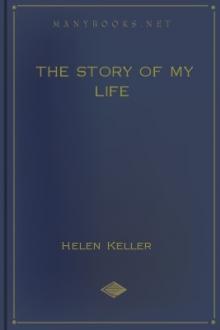The World I Live In by Helen Keller (best e reader for manga txt) 📕

- Author: Helen Keller
- Performer: -
Book online «The World I Live In by Helen Keller (best e reader for manga txt) 📕». Author Helen Keller
The Project Gutenberg eBook of The World I Live In, by Helen Keller
almost no restrictions whatsoever. You may copy it, give it away or
re-use it under the terms of the Project Gutenberg License included
with this eBook or online at www.gutenberg.org
Title: The World I Live In
Author: Helen Keller
Release Date: January 1, 2009 [eBook #27683]
Language: English
Character set encoding: ISO-8859-1
***START OF THE PROJECT GUTENBERG EBOOK THE WORLD I LIVE IN***
E-text prepared by David Clarke, Emmy,
and the Project Gutenberg Online Distributed Proofreading Team
(http://www.pgdp.net)
THE WORLD I LIVE IN
"The autobiography of Helen Keller is unquestionably one of the most remarkable records ever published."—British Weekly.
"This book is a human document of intense interest, and without a parallel, we suppose, in the history of literature."—Yorkshire Post.
"Miss Keller's autobiography, well written and full of practical interest in all sides of life, literary, artistic and social, records an extraordinary victory over physical disabilities."—Times.
"This book is a record of the miraculous. No one can read it without being profoundly touched by the patience and devotion which brought the blind, deaf-mute child into touch with human life, without being filled with wonder at the quick intelligence which made such communication with the outside world possible."—Queen.
Popular Edition, net, 1s.
The Story of My Life
————
The Practice of Optimism
Cloth, net, 1s. 6d.; paper, net, 1s.
————
London: Hodder & Stoughton, E.C.
ILLUSTRATED
HODDER AND STOUGHTON
LONDON NEW YORK TORONTO
HENRY H. ROGERS
MY DEAR FRIEND OF
MANY YEARS
PREFACE
Every book is in a sense autobiographical. But while other self-recording creatures are permitted at least to seem to change the subject, apparently nobody cares what I think of the tariff, the conservation of our natural resources, or the conflicts which revolve about the name of Dreyfus. If I offer to reform the education system of the world, my editorial friends say, "That is interesting. But will you please tell us what idea you had of goodness and beauty when you were six years old?" First they ask me to tell the life of the child who is mother to the woman. Then they make me my own daughter and ask for an account of grown-up sensations. Finally I am requested to write about my dreams, and thus I become an anachronical grandmother; for it is the special privilege of old age to relate dreams. The editors are so kind that they are no doubt right in thinking that nothing I have to say about the affairs of the universe would be interesting. But until they give me opportunity to write about matters that are not-me, the world must go on uninstructed and unreformed, and I can only do my best with the one small subject upon which I am allowed to discourse.
In "The Chant of Darkness" I did not intend to set up as a poet. I thought I was writing prose, except for the magnificent passage from Job which I was paraphrasing. But this part seemed to my friends to separate itself from the exposition, and I made it into a kind of poem.
CONTENTS
CHAPTER I PAGE The Seeing Hand 3
CHAPTER II The Hands of Others 19
CHAPTER III The Hand of the Race 33
CHAPTER IV The Power of Touch 45
CHAPTER V The Finer Vibrations 63
CHAPTER VI Smell, the Fallen Angel 77
CHAPTER VII Relative Values of the Senses 95
CHAPTER VIII The Five-sensed World 103
CHAPTER IX Inward Visions 115
CHAPTER X Analogies in Sense Perception 129
CHAPTER X Before the Soul Dawn 141
CHAPTER XII The Larger Sanctions 153
CHAPTER XIII The Dream World 169
CHAPTER XIV Dreams and Reality 195
CHAPTER XV A Waking Dream 209
A CHANT OF DARKNESS 229 ILLUSTRATIONS
This small incident started me on a chat about hands, and if my chat is fortunate I have to thank my dog-star. In any case, it is pleasant to have something to talk about that no one else has monopolized; it is like making a new path in the trackless woods, blazing the trail where no foot has pressed before. I am glad to take you by the hand and lead you along an untrodden way into a world where the hand is supreme. But at the very outset we encounter a difficulty. You are so accustomed to light, I fear you will stumble when I try to guide you through the land of darkness and silence. The blind are not supposed to be the best of guides. Still, though I cannot warrant not to lose you, I promise that you shall not be led into fire or water, or fall into a deep pit. If you will follow me patiently, you will find that "there's a sound so fine, nothing lives 'twixt it and silence," and that there is more meant in things than meets the eye.
My hand is to me what your hearing and sight together are to you. In large measure we travel the same highways, read the same books, speak the same language, yet our experiences are different. All my comings and goings turn on the hand as on a pivot. It is the hand that binds me to the world of men and women. The hand is my feeler with which I reach through isolation and darkness and seize every pleasure, every activity that my fingers encounter. With the dropping of a little word from another's hand into mine, a slight flutter of the fingers, began the intelligence, the joy, the fullness of my life. Like Job, I feel as if a hand had made me, fashioned me together round about and moulded my very soul.
In all my experiences and thoughts I am conscious of a hand. Whatever moves me, whatever thrills me, is as a hand that touches me in the dark, and that touch is my reality. You might as well say that a sight which makes you glad, or a blow which brings the stinging tears to your eyes, is unreal as to say that those impressions are unreal which I have accumulated by means of touch. The delicate tremble of a butterfly's wings in my hand, the soft petals of violets curling in the cool folds of their leaves or lifting sweetly out of the meadow-grass, the clear, firm outline of face and limb, the smooth arch of a horse's neck and the velvety touch of his nose—all these, and a thousand resultant combinations, which take shape in my mind, constitute my world.
Ideas make the world we live in, and impressions furnish ideas. My world is built of touch-sensations, devoid of physical colour and sound; but without colour and sound it breathes and throbs with life. Every object is associated in my mind with tactual qualities which, combined in countless ways, give me a sense of power, of beauty, or of incongruity: for with my hands I can feel the comic as well as the beautiful in the outward appearance of things. Remember that you, dependent on your sight, do not realize how many things are tangible. All palpable things are mobile or rigid, solid or liquid, big or small, warm or cold, and these qualities are variously modified. The coolness of a water-lily rounding into bloom is different from the coolness of an evening wind in summer, and different again from the coolness of the rain that soaks into the hearts of growing things and gives them life and body. The velvet of the rose is not that of a ripe peach or of a baby's dimpled cheek. The hardness of the rock is to the hardness of wood what a man's deep bass is to a woman's voice when it is low. What I call beauty I find in certain combinations of all these qualities, and is largely derived from the flow of curved and straight lines which is over all things.
"What does the straight line mean to you?" I think you will ask.
It means several things. It symbolizes duty. It seems to have the quality of inexorableness that duty has. When I have something to do that must not be set aside, I feel as if I were going forward in a straight line, bound to arrive somewhere, or go on forever without swerving to the right or to the left.
That is what it means. To escape this moralizing you should ask, "How does the straight line feel?" It feels, as I suppose it looks, straight—a dull thought drawn out endlessly. Eloquence to the touch resides not in straight lines, but in unstraight lines, or in many curved and straight lines together. They appear and disappear, are now deep, now shallow, now broken off or lengthened or swelling. They rise and sink beneath my fingers, they are full of sudden starts and pauses, and their variety is inexhaustible and wonderful. So you see I am not shut out from the region of the beautiful, though my hand cannot perceive the brilliant colours in the sunset or on the mountain, or reach into the blue depths of the sky.
Physics tells me that I am well off in a world which, I am told, knows neither cold nor sound, but is made in terms of size, shape, and inherent qualities; for at least every object appears to my fingers standing solidly right side up, and is not an inverted





Comments (0)